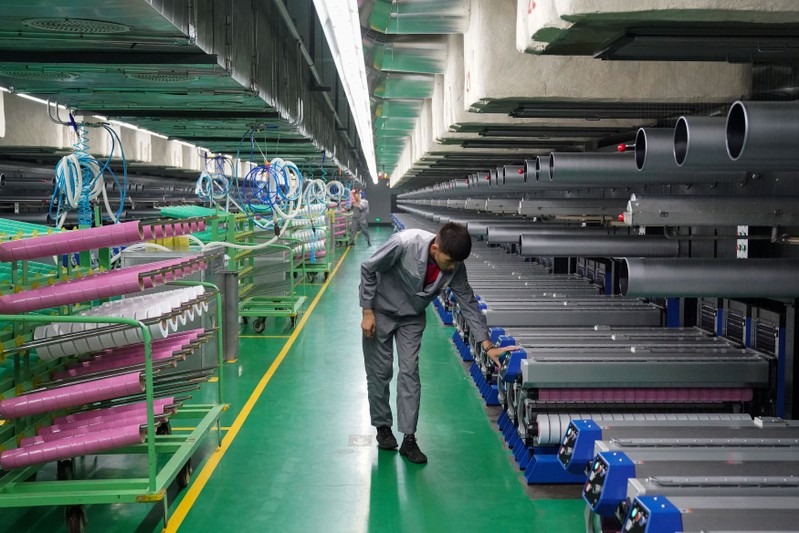
A worker inspects machines at a factory manufacturing spandex in an energy and chemical base in Yinchuan, Ningxia Hui Autonomous Region, China July 24, 2018. REUTERS/Stringer
July 31, 2018
BEIJING (Reuters) – Growth in China’s manufacturing sector slowed more than expected in July, as the worsening trade dispute with Washington and bad weather weighed on factory activity.
The official Purchasing Managers’ Index (PMI) released on Tuesday fell to 51.2 in July, from 51.5 in June, but remained above the 50-point mark that separates growth from contraction for a 24th straight month. The reading was the lowest since February.
Analysts surveyed by Reuters had forecast the reading would dip marginally to 51.3.
Firms were hurt by trade frictions, rain and high temperatures in July, which is also a cyclically slow season for some sectors, said statistics bureau official Zhao Qinghe in a statement released with the data.
The gauge of factory activity is the first major reading of the health of the world’s second largest economy since the second quarter of this year.
China logged a modest slowdown in its growth in the second quarter from the previous quarter, as the government’s multi-year efforts to tackle debt risks hit growth and a trade war with the United States threatened exports.
The PMI’s July new export orders index remained in contraction in July, in line with the previous month’s reading of 49.8.
Earlier this month, the United States imposed tariffs on $34 billion of Chinese imports. China promptly responded by levying taxes on the same value of U.S. products, leading U.S. President Donald Trump to threaten tariffs on $500 billion of Chinese goods, which is equal to the total value of China’s exports to the United States.
China’s June exports growth cooled slightly from the previous month but remained solid, as exporters rushed to move shipments before tariffs went into effect on July 6.
The contraction in new export orders in July could indicate tougher times ahead for exports.
A production sub-index fell to 53.0 in July from 53.6 in June, while a new orders sub-index declined to 52.3 from 53.2.
Another survey released by the NBS on Tuesday showed growth in China’s service sector moderating in July, with the official non-manufacturing Purchasing Managers’ Index (PMI) dipping to 54.0 from 55.0 the previous month.
Chinese policymakers are counting on growth in services and consumption to rebalance their economic growth model from its heavy reliance on investment and exports. The services sector now accounts for more than half of the economy, with rising wages giving Chinese consumers more spending clout.
However, factory output growth in June slumped to a four-year low while year-to-date retail sales also cooled, a sign that both the industrial and consumer sectors are losing momentum.
In an effort to help soften the blow to the economy from the Sino-U.S. trade war, Beijing plans to put more money into infrastructure projects and ease borrowing curbs on local governments, according to a Reuters exclusive citing policy sources.
The composite PMI, which covers both manufacturing and services activity, slipped to 53.6 in July, from June’s 54.4.
(Reporting by Elias Glenn and Lusha Zhang; Editing by Sam Holmes)
